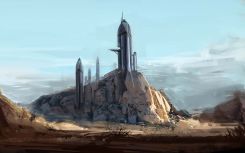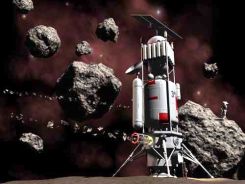Tau Ceti
Tau Ceti is a system located in close proximity of Sol, and serves as the main base of operation for the megacorporation NanoTrasen. First settled in the mid 2100s, it houses three colonized planets, as well as two uninhabited ones.
Tau Ceti is governed by the Republic of Biesel, a young Republic that became independent of the economically troubled Sol Alliance in 2452 due to heavy pressure by Nanotrasen. There is still resentment in the Sol Alliance over the loss of such a wealthy system, while Nanotrasen continues to have a heavy hand in all levels of Tau Ceti.
Planets
Biesel
Main articles: Biesel, Mendell City

The third closest planet to Tau Ceti's star, Biesel is an Earth analog which benefits from a temperate climate and breathable atmosphere. Water represents 56% of the planet's surface.
Biesel is the central population hub for Tau Ceti, with many large cities and a registered surface population approaching 11 billion. All settlements on Biesel were built with a goal of sustainable development in mind, so the threat of impending environmental disaster due to overpopulation or pollution is relatively nonexistent. Most of the equator of Biesel has been set aside for agricultural purposes, given the mild climate. The planetary capital of Biesel is Mendell City, a megalopolis in the southeastern quadrant of the planet. In orbit around Biesel, and its moon Valkyrie, are many multipurpose space stations, including orbital defense platforms and shipyards In a high orbit around the planet is Nanotrasen's Tau Ceti Branch Central Command Platform, the NSS Odin, where bluespace shuttles depart from and return to as they move personnel between the various Nanotrasen installations around Tau Ceti. The combined population of spacers around Biesel approaches 222 million.
Biesel is primarily a financial and agricultural center, with most of it's citizens working in it's service industry or commuting to New Gibson. Tourism is a major source of income, with visitors being drawn to Biesel's sprawling shopping centers and national parks alike.
New Gibson
Main article: New Gibson

Considered an ice world due to its location just outside the outer edge of the habitable zone of its parent star, producing very cold temperatures, New Gibson is the industrial powerhouse of Tau Ceti. As the atmosphere on New Gibson is too thin to support life, all of its population lives under biodomes.
The planet is a prime location for industrial development, since minimal terraforming is required, and populations of workers can be sustained in biodomes scattered across the barren landscape. Any activity on the planet's surface requires EVA equipment, but due to its high level of industrial development, the planet is the largest producer of consumer appliances, ship components, space station modules, and other manufactured goods in Tau Ceti.
The planetary capital of New Gibson is the Hengsha Arcology, or simply Hengsha, a self-contained complex mimicking the landscape of Biesel, complete with parks, waterfalls and wildlife. While New Gibson has a complex dedicated to virtually all industries, from personal grooming equipment to advanced AI components, it's major industries are shipbuilding, construction materials, enterprise-scale medical equipment and electronics.
Luthien
Main article: Luthien

Placed within the inner reach of Tau Ceti's habitable zone, Luthien is a desert planet with a thin, unbreathable atmosphere and small amounts of liquid water located around its cooler poles. The small amounts of human habitation are found near the north and south polar seas, and constitute of controlled-environment biodomes and research stations.
Luthien is the site of many testing and research facilities, such as those dedicated to weapons testing, or the development of flora and fauna that are able to adapt to extreme environments.
Caprice
The closest planet to Tau Ceti's star, caprice is a barren world completely devoid of life. The harsh surface conditions prove hostile for all attempts of exploration, and even advanced scientific equipment cannot survive in its extreme environment for long without breaking down.
Reade
The furthest of the five planets of Tau Ceti, Reade, is a small planet entirely devoid of atmosphere, water, or useful minerals. Mostly ignored by the rest of the system's population, it is nevertheless rumored to harbor pirate outposts on the planet surface. Civilian travel is discouraged past this point of the system.
Other Bodies
Chandras
Chandras is an icy body in distant orbit of Tau Ceti. Although its surface contains lakes of liquid nitrogen, it is entirely metal-deficient, and possessing no infrastructures to speak of, is uninhabited and of low interest for the system.
The Dust Belt
Past Chandras, the Dust Belt is a thick ring of debris encircling Tau Ceti's solar plane and enclosing its inner planets. Debris vary in size ranging from microscopic dust particles to large asteroids the size of small moons. Contrary to popular belief, travel through the Dust Belt does not pose a major risk to spaceships, although the danger of rogue asteroids has discouraged mining operations from setting up in the area.
Dumas
Dumas is an extremely small rocky body that orbits within the far reaches of Tau Ceti - obscured almost entirely by the dust belt, one of its defining features is an almost complete lack of light, resulting in temperatures nearing the absolute zero. It is rumored that smugglers may be using stations in orbit of Dumas to move goods in and out of the Tau Ceti system.
The Romanovich Cloud

Main article: Romanovich Cloud
The Romanovich Cloud is a shell of icy, rocky and metallic bodies that orbit very distant Tau Ceti, past even the Dust Belt. Rich in deposits of precious and semi-precious metals as well as radioactive elements, the Romanovich Cloud is the source of nearly all the raw materials used within Tau Ceti.
The cloud is also the only known source of Plasma, a volatile but highly-sought after compound, known for its uses in the biomedical and energy industries. Most of the sources of Plasma within the Romanovich Cloud are under control of NanoTrasen, which has consequently established many high-tech research facilities in the area in the past few years.







